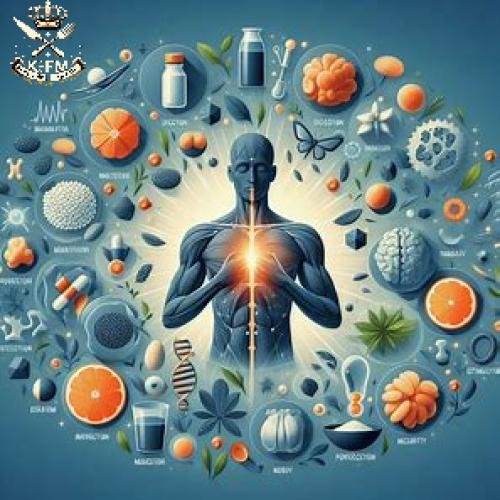What is Chlorophyll?
Chlorophyll is the primary element responsible for giving plants their distinctive green color. This pigment plays a vital role in photosynthesis, a biochemical process in which plants absorb sunlight to convert carbon dioxide and water into food. However, the benefits of chlorophyll are not limited to its role in plants; it also offers numerous health advantages for humans.

The Nutritional and Health Importance of Chlorophyll
Chlorophyll is not just a pigment; it is a vital nutrient for human health. It participates in numerous essential bodily functions and has a wide range of positive health effects. In recent years, chlorophyll has become available in various forms, such as supplements and medications, but the best way to consume it is through natural sources.
Comparison Between Chlorophyll and Hemoglobin
Chlorophyll and hemoglobin, the red pigment in blood, share significant similarities. While hemoglobin transports oxygen to the body’s cells, chlorophyll performs an opposite function in plants by converting carbon dioxide and water into nutrients using light. This parallel highlights the biological importance of both compounds.
Health Benefits of Chlorophyll
1. Enhancing Blood Quality
Chlorophyll helps increase hemoglobin levels in the blood, improving the body’s ability to transport oxygen efficiently.
2. Organ Stimulation
It boosts the functionality of vital organs like the heart and intestines and enhances nerve and muscle energy.
3. Promoting Growth and Tissue Regeneration
Chlorophyll supports tissue growth and repair, which contributes to healthy skin and hair.
4. Cancer Prevention
Chlorophyll may aid in cancer prevention by neutralizing harmful free radicals that damage healthy cells. Research indicates its potential in inhibiting cancer cell growth and reducing cancer-related inflammation.
5. Heart Health
Chlorophyll may help lower blood pressure and improve blood circulation, reducing the risk of cardiovascular diseases. Studies suggest its role in managing cholesterol and triglyceride levels.
6. Alleviating Constipation
It promotes better digestion and increases bowel movement, reducing constipation issues.
7. Anti-inflammatory Properties
Chlorophyll has anti-inflammatory properties that can alleviate symptoms of chronic inflammatory conditions.
8. Delaying Aging Symptoms
By improving skin elasticity and reducing wrinkles, chlorophyll may help slow down signs of aging.
Potential Side Effects of Chlorophyll:
- Digestive Issues: Some individuals may experience stomach discomfort such as gas or bloating when taking chlorophyll supplements.
- Allergy: In rare cases, individuals with plant allergies may experience allergic reactions such as rashes or itching.
- Change in Stool Color: Consuming chlorophyll can cause the stool to turn green, which is a normal occurrence and does not require concern.
- Kidney Effects: In very rare cases, chlorophyll may affect the kidneys when taken in large amounts, so it's important to consult a doctor if you have kidney issues.
Recommended Daily Dose:
The appropriate dosage of chlorophyll supplements depends on the specific product and its concentrations. The recommended dose usually ranges from 100 to 300 mg per day, but it is always best to follow the instructions on the product or consult a doctor.
Chlorophyll can be taken with meals to improve absorption and reduce any potential digestive side effects. It can be consumed in liquid or capsule form, and it is generally recommended to take it in the morning or at midday.
The Role of Chlorophyll in a Healthy Diet
Incorporating chlorophyll-rich foods into your diet is a natural and effective way to boost overall health. This can be achieved by consuming green leafy vegetables such as spinach, broccoli, cilantro, and arugula. Other dark green foods like kale, collard greens, water spinach, and algae are also excellent sources.
These foods should constitute at least 10% of daily meals to maximize their benefits and support a well-balanced diet.

How to Incorporate Chlorophyll into Your Diet
If you want to benefit from chlorophyll's advantages, start by adding fresh plant-based foods to your meals. For instance, a green salad consisting of lettuce, tomatoes, green peppers, cucumbers, onions, parsley, celery, and carrots can be an excellent addition to your daily diet. Enhance its taste and nutritional value by adding olive oil, lemon juice, and a touch of garlic.
Drug Interactions:
Despite its many benefits, chlorophyll may interact with certain medications. For example:
- Blood Thinners: Chlorophyll may enhance the effect of medications such as warfarin, increasing the risk of bleeding.
- Diabetes Medications: Chlorophyll can affect blood sugar levels, requiring dose adjustments for patients taking medications to lower blood sugar.
- Blood Pressure Medications: Due to its effect on improving blood flow and lowering blood pressure, chlorophyll may interact with antihypertensive drugs and cause excessive effects.
Therefore, it is important to consult a doctor before taking chlorophyll supplements if you are taking certain medications.
Frequently Asked Questions:
Are there scientifically proven benefits of chlorophyll in cancer prevention?
Yes, there are some studies suggesting that chlorophyll may help prevent certain types of cancer. For example, a study conducted by the University of Chicago showed that chlorophyll can reduce the growth of cancer cells in certain tissues, such as the liver and stomach.
Can children take chlorophyll supplements?
In general, children can take chlorophyll, but it is important to consult a doctor first to ensure the appropriate dosage and to evaluate the child's health condition.
Is chlorophyll safe for pregnant and breastfeeding women?
Chlorophyll is generally considered safe during pregnancy and breastfeeding when taken in moderation. However, pregnant or breastfeeding women should consult a doctor before taking chlorophyll supplements to ensure it is safe based on their specific health condition.
Conclusion
In summary, chlorophyll is a fundamental nutrient that plays a vital role in enhancing human health and well-being. By regularly consuming foods rich in this green pigment, you can improve blood quality, invigorate your organs, and support tissue growth and regeneration. Let’s always prioritize maintaining a healthy diet and adopt nutritious habits for a better, healthier life.




















